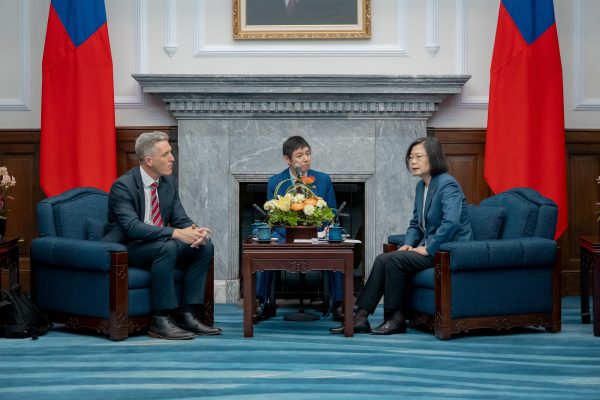In just shy of 18 months in the portfolio, Trade Minister Don Farrell has presided over the entry into force of free trade agreements with India and the United Kingdom, as well as pressing for progress on negotiations with the European Union. Meanwhile, Australia’s free trade agreement with ASEAN and New Zealand is being upgraded and the United Kingdom has joined the Comprehensive and Progressive Agreement for Trans-Pacific Partnership (CPTPP).
Despite these trade wins, there’s still a big Taiwan-shaped hole in Australia’s efforts to moderate its export dependence on China.
The Taiwanese economy sucked in a colossal AU$30 billion worth of Australian goods in 2022, making it Australia’s fourth biggest merchandise export destination. As well as eclipsing even India and the European Union, it was nearly 10 times more lucrative for Australian goods exporters than the United Kingdom and more than double as valuable as New Zealand. Australia’s goods exports to Taiwan’s market of just under 24 million people were worth approximately 40 per cent of the total goods exports to the 10-member state ASEAN market of 667 million people.
This doesn’t mean that Australia should abandon or downplay the importance of free trade agreements with India, the European Union, the United Kingdom and others. The long-term benefits for Australian exporters are likely to be especially great in the case of the trade agreements with the European Union and Indian markets given the size and wealth of the former and the stupendous growth potential of the latter.
But if it’s worth Australia’s energy to pursue a bilateral trade agreement with the United Kingdom or bring it into the CPTPP, then there’s a compelling economic case for doing the same with Taiwan — a market vastly more important for Australian exporters. This Taiwan oversight is particularly glaring when looking at the overall picture of Australia’s trade ties.
Despite shared membership of the World Trade Organization and Asia–Pacific Economic Cooperation, Taiwan is conspicuously absent from Australia’s free trade agreements. Of Australia’s top 10 export destinations in 2022, Taiwan was the only one in which Australian exporters didn’t enjoy the benefits of either a bilateral or regional free trade agreement.
True, Australia’s exports to Taiwan by value are dominated by energy and minerals, which don’t face high tariffs. But with agricultural imports to Taiwan subjected to average tariff rates of nearly 16 per cent, a free trade agreement would give Australian primary producers a competitive edge in one of Asia’s wealthiest consumer markets. Given that it was Australia’s wine growers and lobster fishers that suffered most at the hands of China’s economic coercion, there is a powerful case for gaining better access for Australian agricultural products in reliable export markets like Taiwan.
Regardless of the economic logic, any push for freer trade with Taiwan can’t escape the constraints of geopolitics.
Getting Taiwan into the CPTPP will probably remain an implausibly long shot given Beijing’s competing bid and opposition to Taipei joining combined with the trade pact’s consensus-based accession process. But that still leaves open the option of pursuing a much more achievable bilateral free trade agreement with Taiwan. With Australia already Taiwan’s seventh-largest trading partner, this is an option that Taipei also supports.
Having pressured Canberra out of its previous plan to negotiate a free trade agreement with Taipei during the Malcolm Turnbull government, Beijing would oppose moves to formally liberalise trade.
Although Singapore and New Zealand already have free trade agreements with Taiwan, these were signed in 2013 when the more Beijing-friendly Nationalist government was in power and when China wasn’t trying so hard to internationally isolate Taipei. Despite likely opposition from Beijing, the Albanese government shouldn’t allow its trade access agenda to be held hostage to Chinese government concerns. Not least because Beijing’s enthusiasm for relationship repair probably gives Canberra more licence to take positions that China doesn’t like.
Since mid-2022, Beijing has moved to normalise diplomatic ties and incrementally dismantle trade restrictions despite Canberra continuing to pursue policies that disappoint the Chinese government — everything from securitising Australia’s critical minerals industry to calling out China’s human rights abuses in the United Nations. Although Beijing might rebuke Canberra diplomatically and issue private warnings if it pursues a free trade agreement with Taipei, the last 17 months of bilateral relationship repair suggest that China won’t be dissuaded from embracing warmer ties with Australia.
In an age in which interdependence is being more regularly weaponised, trade policy isn’t solely driven by economic complementarities. Trust matters too. Conveniently, the Australia–Taiwan relationship has both in abundance. Not only are the Australian and Taiwanese economies already trading a significant amount, but deeper export dependence on Taiwan comes with negligible risks of economic coercion.
The Australian and Chinese economies might be tied together by deep economic complementarities for decades to come. But in contrast to China, Australia can be confident that Taiwan won’t weaponise trade ties to push political points.
Benjamin Herscovitch is Research Fellow at The Australian National University and author of Beijing to Canberra and Back, a newsletter chronicling Australia–China relations.

